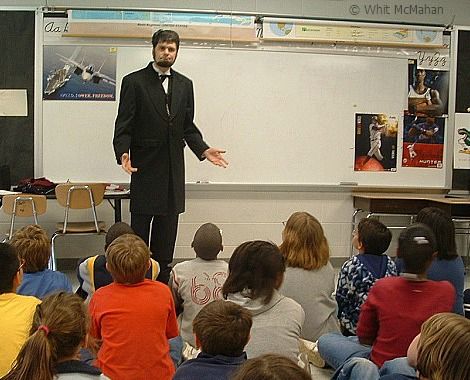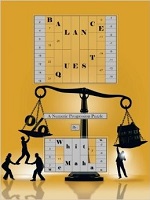Verbal Repetition: Abraham Lincoln's Go-To Memory Technique
by guest author Whit McMahanIn a one-room classroom nestled among the thickening oaks and tiny hills of central Kentucky, a group of small boys and girls were sitting in a semi-circle taking turns reading their lesson. The school master's selection of the day was a portion of the Bible from the book of Daniel, chapter III:
And those three men, Shadrach, Meshach, and Abednego, fell down into the midst of the burning fiery furnace.
These little ones, struggling to comprehend the names, were mostly farm children of the community. Most had never pronounced much more than "elephant", nor had some of their parents even learned to read. Flubbing on such dressy names as these would not have been unusual, except that one bright child in the class had taken his lesson home.

Whit McMahan presents Lincoln at Nashville, TN
Elementary School - Fourth Grade class
At his turn, he would correctly pronounce not only the names of the three condemned men, but recite from memory the pre-assigned set of ten verses, which he had learned during playground recess. His name was Abraham Lincoln.
The veteran school master of the class, Zachariah Riney, and others teachers like him believed that reciting or "blabbing" the lesson aloud strengthened the children's memory of the information. Modern research indicates they were likely right.
This blab school method of instruction was popular in the U.S. during the 19th century, especially in pioneer communities where textbooks and materials were uncommon.
Abraham's unusual abilities would progress following his family's move to Indiana. Yet among the hollows and beaten trails of the Pigeon Creek community, an impressive memory would prove of little value in dressing hogs and seasonal planting. Still at the general store, young Abraham was determined to stand upon the porch and mimic, with precision, the words of a wandering politician or retell a medley of yarns once spun by his father or grandfather.
The same method once used in the blab school would prove useful in his convincing skills too. The art of "changing minds", which had captured his fancy, required a precision memory of political and social issues of the day.
By his twenties, Abe's continual dissatisfaction with farm life soon trumped his father's need for a good ax man or bean sewer. Using his old technique, Lincoln was now determined to study and comprehend law.
Mental recall, he found as a young lawyer, involved not only pouring over the facts, but careful enunciation of the material out loud. William Herndon, Lincoln's law partner in Springfield, Illinois, had at many times been distracted (even annoyed) by his reading aloud a newspaper article of interest.
Prevailing at national debates, Lincoln later found, succeeded only so much as his verbal preparedness. Even after entry into Congress and the Presidency, Lincoln would find speaking words aloud directly linked with memory improvement.
"Blab School" Verbal Repetition Still Works Today
And so it seems that the greatest of American minds had been influenced by not much more than the simplest of techniques. As one of many "Presenters" taking on the personae of Lincoln before live audiences, I often find myself preparing for my talks in the same manner as the man I admire.
I am also aware that I am not the first "Lincoln Presenter" to drive down the highway moving my lips and, for the sake of awkwardness, pausing at traffic lights.
Yet despite the many elaborate memory improvement guides at my disposal, I invariably find myself returning to Lincoln's blab school approach in rehearsing my scripts. As a presenter and motivator, I believe that verbal repetition is a proven recipe for memory improvement. Abraham Lincoln also found this technique a key to improving his memory throughout life.
Think a moment about how you memorize facts currently. Do you make notes, simply remember them, or rely upon an electronic device? Do you concentrate better at work or school than at home?
If you only depend on your iPad, remember that an electronic copy is bytes, bits, and electrons. Tangibly, it doesn't exist. Always make a backup copy of your personal information, store it in a cloud, or make a paper copy.
If you don't have time to make notes or simply can't use them, state your thought verbally and distinctly three times. Does your task or statement seem clearer an hour later?
Repeat your thought out loud again the next morning. Does it stay with you throughout the day? If you frequently lose your keys, for instance, state verbally three times where you are placing them.
You may find that your mind, the greatest computer ever made, is more capable than you first thought!
Whit McMahan is an IT Specialist and part-time Lincoln Presenter living in Nashville, TN. He is a Civil War re-enactor, historical collector, and custodian of a Robert Todd Lincoln law book collection.
He holds a B.S. degree in Computer Science and several related certifications.
By experimenting with mathematical properties of addition, he developed the concept for the Balance Quest (BQ) logic puzzle.
Published: 04/25/2014
Last Updated: 06/11/2020

Newest / Popular
Multiplayer
Board Games
Card & Tile
Concentration
Math / Memory
Puzzles A-M
Puzzles N-Z
Time Mgmt
Word Games
- Retro Flash -
Also:
Bubble Pop
• Solitaire
• Tetris
Checkers
• Mahjong Tiles
•Typing
No sign-up or log-in needed. Just go to a game page and start playing! ![]()
Free Printable Puzzles:
Sudoku • Crosswords • Word Search

Hippocampus? Working memory? Spaced repetition?
Look up memory or brain terms in the A-Z glossary of definitions.









